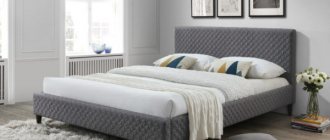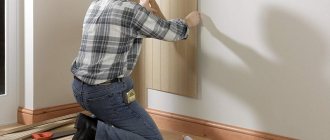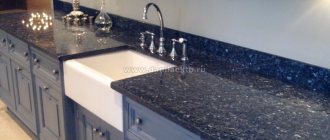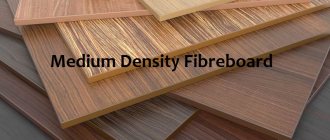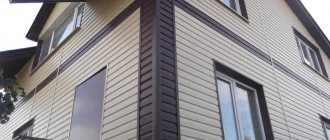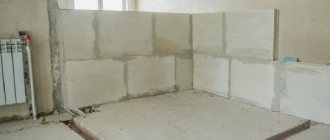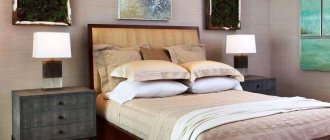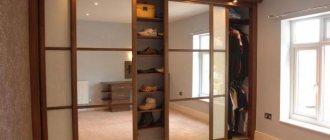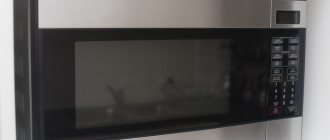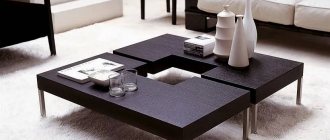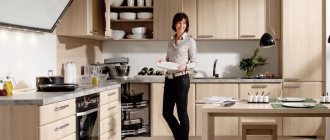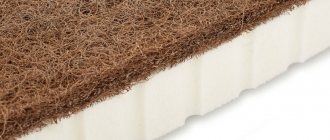What kind of material is this? Decoding the abbreviation
MDF is an abbreviation that comes from the English language. Literally translated, the name of the material sounds like MEDIUM DENSITY FIBERBOARD. The first letters of these words served as the basis for the creation of a familiar colloquial term. Translated into Russian, the name of the material stands for medium-density fiberboard.
Composition and Characteristics
In terms of its structure, MDF is a wood fiber board consisting of crushed sawdust. During the manufacturing process, the raw materials are cleared of sawdust and converted into a powder state. Then the resulting composition is treated with steam and an adhesive base is added: lignin and paraffin.
Among the main advantages of MDF are the following characteristics:
- Resistance to dynamic loads. To break an MDF panel, a force of 15 MPa must be applied. According to mechanical properties. The material is significantly superior to solid wood.
- Environmental Safety. The release of formaldehyde from the panels must meet the requirements:
Test method Release rate into air Purpose of tests Chamber method according to GOST 30255-95 no more than 0.124 mg/m3 air Qualification and control periodic tests Gas analysis method according to GOST 53867-2010 no more than 3.5 mg/m2 per hour Production control - Reliability. The material has increased moisture resistance, is absolutely neutral to temperature changes and direct sunlight.
- Easy to process. With high strength, MDF is easy to process; if desired, you can decorate the panel with decorative cuttings.
- Density. MDF from 600 to 850 kg/cub.m. Fiberboard is also produced in low density (LDF) from 200 to 600 kg/m3 and high density (HDF) over 800 kg/m3 .
It is worth noting that fungus and mold do not appear on the slabs.
Choice
When choosing a material, you need to check whether the product has cracks or chips. All kinds of indentations are unacceptable. If such defects are detected, there is no guarantee that the material will have high strength indicators.
When purchasing MDF, pay attention to its smell. It should not be pronounced; the color palette should have the same tonality.
If you handle the panels carefully, they will not break. This should be taken into account during operation. In this regard, the tree is superior to its modern counterpart. Choosing an MDF panel taking into account the size of the sheet and its thickness will allow you to determine the price for one sheet.
MDF or PVC: which is better?
It’s worth clarifying right away that two finishing materials (MDF and PVC) are widely used in home construction and have no complaints about quality. Therefore, when choosing, you need to focus on the area of application. For example: MDF is considered more environmentally friendly, so it will be suitable for decorating a nursery or living room without any problems. PVC is impervious to any aggressive influences, so it is often used to decorate bathrooms and kitchens.
It is worth noting that PVC has minimal weight, so when installing it is quite possible to do it yourself. However, this material is very susceptible to mechanical damage, so even a slight blow can damage the surface. MDF is more resistant to external influences, but it cannot remain in a humid environment for a long time.
Recommendations for working with plastic when finishing
If the wall is flat, then the material can be attached directly to it. It makes sense to make a frame when you need to cover up old finishes (wallpaper, paint, tiles) or level a wall without plaster.
In addition, the lathing improves sound insulation, helps retain heat, and leaves space for ventilation behind the plastic.
It is economical and easy to make a base from wood. Modern antibacterial compounds contribute to the long service life of wood structures. The bars are installed parallel to the direction of the PVC panels, every 50-60 cm.
The frame is also made from U-shaped plastic profiles. Its advantage is that it is insensitive to moisture, lightweight, does not deform due to temperature changes, and is not electrically conductive.
The profile must be secured in increments of no more than 30 cm, with self-tapping screws or dowels every 0.5-1 m. To join the U-shaped parts together, cuts are made at 90˚, 45˚, 30˚. To secure the plastic, you will need clamps.
To work with panels you will need moldings:
- internal and external corners;
- joints;
- the edges; baseboards;
- finishing elements;
- F-profiles.
Living rooms
If treated with an antiseptic, then the frame in the living room can be made from wooden beams.
The premises are decorated with wood, stone, and white brick. Use decorative, laminated or mirror plastic.
One of the walls can be decorated with PVC material of other shapes. Use rectangular or square structures measuring 0.3-0.98 m, highlight the seams.
Bathroom and toilet
For a bathroom, it is better to make a frame from a galvanized profile or plastic. The material is more suitable without a relief - high humidity can cause mold or mildew, and the textured surface is difficult to clean.
Bathroom panels go well with ceramic tiles, textured plaster, or paint. The main thing is to choose the right shades. It will work out well if you alternate the width and contrast of the elements.
Prints and patterns of different colors will help you create an original design. PVC panels for the bathroom go well with a slatted ceiling, into which mirror inserts can be made.
Kitchens
Economy panels (panels at low prices) can be an inexpensive alternative to ceramics for kitchen decoration.
You can choose combinations of brick and natural stone, mosaic, pattern or ornament.
There are tiled modular options from which images are made; patterns can be combined to decorate the entire kitchen or its individual zones.
A few additional tips:
When purchasing plastic material, you should pay attention to the absence of surface flaws and crumpled joints. There should be no translucency at the stiffeners. Tears and cracks should not form if you lightly press the product. Select the width of the panels so that there is less waste
For small apartments, using a panel with a width of 500-600 mm is impractical. The quality of the material can be checked by bending it. There should be no breaks or cracks. In most cases, the more expensive the material, the better it works. Leave ventilation holes (from fungus and mold).
If you want to make lighting on the ceiling from PVC panels or lamps built into it, it won’t hurt to mark and prepare the holes in advance.
Types of wood-fibrous material
There are many varieties of MDF on the domestic market, so problems with choosing a finishing option usually do not arise. The assortment of construction stores usually includes the following categories:
- Laminated . A special film is applied to the surface, which gives standard panels different shades. The surface can be matte or glossy.
- Veneered . This is quite expensive material. Here, veneer made from valuable wood species is glued to both sides of the panel.
- For painting . This is a special type of MDF designed for self-painting. The surface is coated with a special compound that ensures adhesion to dyes.
- Wall panels . Such products are very convenient in terms of installation for interior decoration. A “groove-lock” fastening system is used here, which ensures reliable adhesion of the elements to each other. It is worth noting that the wall panels are attached with a stapler or glue.
- Moisture resistant . This material is impregnated with a special composition, so it can remain in high humidity conditions for a long time. In their properties, such panels are very similar to PVC.
- Flexible . The material is resistant to dynamic loads, so it can bend without receiving mechanical damage. Typically, such panels are used when decorating arches.
MDF boards are used to make interior doors, decorative kitchen splashbacks and cabinet furniture facades. External parameters depend on the type of application.
Production
Lignocellulose fibers from coniferous trees or any hard wood are used to make panels. Using the “dry” method involves choosing a breed whose fiber moisture content is up to 20% when it is in the molding stage.
In order to obtain the finished product, wood fibers are subject to temperature and pressure. In this case, an adhesive substance is added that does not cause allergic reactions. What raw materials are suitable for producing MDF?
These are exclusively natural materials:
- sawdust;
Sawdust
- knots;
- lumber.
Lumber
To obtain the finished product, the raw materials must be refined, softened with the addition of hot steam and a special screw mechanism. Next, glue is added. The next step will be drying the material. This will take time and also adherence to technology.
In order for a dry mixture to form, it is necessary to lay the material on the plate and gradually compress it. After the product has taken shape, it must be processed using the required pressure and temperature.
In this state, the material is able to change colors from light to chocolate shades. When the slab has cooled to normal temperature, it must be cut to the required size. Next, the slab is trimmed.
dimensions
Depending on the area of application of MDF, the dimensions of the facing material also change. Here you can derive the following standards:
- Wall panels. The standard length of the wall panel is 2.62 meters, however, some manufacturers produce products with lengths 2.44 and 2.8 m. Width may vary within 100-900 mm. Panels are divided into types depending on width P-1, P-2, P-3, P-4, P-5 (100, 125, 150, 175, 250). With panel thickness 3-30 mm. The thickness of veneered MDF can reach 60 mm.
Compliance with quality requirements:Specific resistance during normal coating separation. MPa, not less 0,4 Coating abrasion resistance, rpm, not less 30 Hardness of protective and decorative coating, microns. no more 120 Warping, µm/m, no more 1.5 - Plates . The length of the material is usually about 1.5 meters , width - 100-900 mm . The thickness of MDF boards varies between 6-24 mm .
- Facades . Considering the various options and dimensions of furniture, there are no strictly defined standards. The following parameters can be considered as a basis: thickness 16 mm , height 140-934 and width 296-596 mm .
- Aprons . For the manufacture of decorative aprons, furniture panels are usually used, which have the following characteristics: length - 3,000 , width - 600 and thickness 6-10 mm .
- Countertops . This element must be resistant to dynamic loads, so the following dimensions are used here: length - 1,000 , width - 600 and thickness 28-38 mm .
- Doors . MDF doors are usually made according to the following standard: thickness - 35-45 mm , height - 190-200 cm , width - 70-90 cm . Read more about door and opening dimensions >>>
It is worth noting that the dimensions given may vary depending on the manufacturer.
Table of parameters of polished sheets.
| Manufacturer country | Dimensions (mm) | Sheet thickness (mm) | Density (kg/m³) | Sheet weight (kg) |
| Russia | 2440×2050 | 3 | 840 | 13 |
| Russia | 2440×1830 | 3 | 840 | 12 |
| Ukraine | 2800×2070 | 3 | 780 | 15 |
| Russia | 2800×2070 | 6 | 750 | 26 |
| Ukraine | 2800×2070 | 6 | 780 | 27 |
| Germany | 2620×2070 | 6 | 800 | 26 |
| Russia | 2800×2070 | 8 | 750 | 35 |
| Ukraine | 2800×2070 | 8 | 780 | 36 |
| Germany | 2620×2070 | 8 | 800 | 35 |
| Russia | 2440×1830 | 10 | 800 | 36 |
| Russia | 2800×2070 | 10 | 750 | 43 |
| Ukraine | 2800×2070 | 10 | 770 | 45 |
| Germany | 2620×2070 | 10 | 790 | 43 |
| Russia | 2800×2070 | 12 | 750 | 52 |
| Ukraine | 2800×2070 | 12 | 770 | 54 |
| Germany | 2620×2070 | 12 | 790 | 51 |
| Russia | 2440×1830 | 16 | 800 | 57 |
| Russia | 2800×2070 | 16 | 750 | 70 |
| Ukraine | 2800×2070 | 16 | 770 | 71 |
| Germany | 2620×2070 | 16 | 790 | 69 |
| Russia | 2440×1830 | 18 | 800 | 64 |
| Russia | 2800×2070 | 18 | 730 | 76 |
| Ukraine | 2800×2070 | 18 | 750 | 78 |
| Germany | 2620×2070 | 18 | 770 | 75 |
| Russia | 2800×2070 | 19 | 730 | 80 |
| Ukraine | 2800×2070 | 19 | 750 | 83 |
| Germany | 2620×2070 | 19 | 770 | 79 |
| Russia | 2800×2070 | 22 | 730 | 93 |
| Ukraine | 2800×2070 | 22 | 750 | 96 |
| Germany | 2620×2070 | 22 | 770 | 92 |
| Russia | 2440×1830 | 24 | 800 | 86 |
| Russia | 2800×2070 | 25 | 730 | 106 |
| Ukraine | 2800×2070 | 25 | 750 | 109 |
| Germany | 2620×2070 | 25 | 770 | 104 |
| Russia | 2800×2070 | 28 | 720 | 117 |
| Ukraine | 2800×2070 | 28 | 740 | 120 |
| Germany | 2620×2070 | 28 | 750 | 114 |
| Russia | 2800×2070 | 30 | 720 | 125 |
| Ukraine | 2800×2070 | 30 | 740 | 129 |
| Germany | 2620×2070 | 30 | 750 | 122 |
| Germany | 2620×2070 | 38 | 750 | 155 |
| Germany | 2620×2070 | 40 | 750 | 163 |
| Germany | 2800×2070 | 40 | 740 | 172 |
Table of parameters of laminated sheets.
| Manufacturer country | Dimensions (mm) | Thickness (mm) | Number of laminated sides | Weight, kg) |
| Russia Ukraine | 2800×2070 | 16 | 1 | 74 |
| Russia Ukraine | 2800×2070 | 16 | 2 | 74 |
| Russia Ukraine | 2800×2070 | 19 | 1 | 88 |
| Russia Ukraine | 2800×2070 | 19 | 2 | 88 |
| Germany | 2620×2070 | 10 | 1 | 43 |
| 2620×2070 | 16 | 1 | 69 | |
| 2620×2070 | 18 | 1 | 78 | |
| 2620×2070 | 19 | 1 | 82 | |
| 2620×2070 | 22 | 1 | 95 |
Table of parameters of sheets laminated with paper film.
| Dimensions (mm) | Thickness (mm) | Weight, kg) |
| 3 | 2440×1830 | 11 |
| 4 | 2440×1830 | 14 |
| 6 | 2440×1830 | 21 |
| 6 | 2800×1830 | 25 |
| 8 | 2800×1830 | 33 |
| 10 | 2440×1830 | 36 |
| 10 | 2800×1830 | 41 |
| 12 | 2800×1830 | 49 |
| 16 | 2440×1830 | 57 |
| 16 | 2800×1830 | 66 |
| 18 | 2440×1830 | 64 |
| 18 | 2800×1830 | 74 |
| 19 | 2800×1830 | 78 |
| 22 | 2800×1830 | 90 |
| 24 | 2440×1830 | 86 |
| 25 | 2800×1830 | 102 |
Varieties and characteristics
All panels of this type are made of plastic called polyvinyl chloride, which everyone is accustomed to abbreviating as PVC. The differences between all types of such planks are their size, coating and thickness. These are the main parameters in which they may differ from each other.
Standard sizes of PVC ceiling panels vary within fairly wide limits and are:
- Width – 25 centimeters
- Length – from 3 to 6 meters
- Thickness – from 5 to 12 millimeters
Non-standard dimensions are also manufactured, while the length of one part can reach 6 meters, and the width reaches 50 centimeters. But such solutions can be found very rarely. Basically, finishing is done in traditional sizes and the main difference is the thickness of the material and the finishing of its front side.
The last characteristic mainly influences the choice of one model or another. The main thing is the appearance of the resulting coating, and here another feature appears - the coating can be either with clearly visible boundaries between the parts used, or without seams.
This is influenced by the type of panels - they can be seamless or regular. Seamless design means that after installation, such planks are connected tightly, without any gaps, ensuring a continuous plane. These panel options cost a little more than regular ones.
On standard parts there are no gaps between them either, but the connection point is quite noticeable. You can see what a ceiling made from these and other types of PVC panels looks like in the photo below.
A classic example of the use of this material. The covering is installed in the bathroom. Its characteristics allow you not to worry about the safety of such a ceiling for many years. Such finishing is not afraid of moisture and various fungi or molds do not grow on them.
Here, seamless PVC panels are used to decorate the ceiling. They really create an almost continuous plane and the joints between the planks are almost invisible. This is greatly facilitated by the special pattern on the front side of the part.
MDF weight
The external dimensions and thickness of the panel play a key role. Weight according to dimensions is given in the tables above. Let's see how the weight of an MDF panel measuring 2,800*2,050 mm (the maximum value on the market) will change, depending on the thickness of the product:
- 3 mm – 16 kg.
- 6 mm – 31 kg.
- 12 mm – 60 kg.
- 22 mm – 106 kg.
- 28 mm – 142 kg.
It is worth noting that the weight of the decorated panels will vary slightly upward.
Length
The typical length of a wall panel is 2.62 m, while some manufacturers have launched products with lengths of 2.44 and 2.8 meters.
The parameters and sizes of the boards vary depending on the MDF manufacturer. So, for example, the popular brand Kronospan produces panels in sizes 2600X200 mm, 2600X325 mm, 2600X153 mm and 2600X200 mm.
The world-famous manufacturer HDM offers panels with parameters of 1300X198 mm and 2600X198 mm. Finally, the Russian one produces panels in a single size 2600X238.
Each manufacturer (within its size range) produces a wide variety of panels, differing in texture and color.
Standard panel colors. Texture
Thanks to modern technologies, you can choose the shade of MDF panels to suit any interior design. In particular, on the market there are textures like stone, natural wood, imitation metal surfaces, copper, silver and mother-of-pearl.
However, the most recognized are the standard MDF colors that imitate solid wood. Here you can select the following colors:
- Apple tree
- Nut
- Ash
- Cedar
- Bleached oak
- Cherry
- Ash
Such panels accurately imitate wood and are suitable for finishing any interior space.
Famous manufacturers
Today's MDF panel manufacturers produce a wide range of products. The buyer is given the opportunity to choose facing materials in size, color and design, something that could only be dreamed of not so long ago. Among the prominent companies on the market are foreign and domestic manufacturers.
KRONOSPAN
The family enterprise appeared in 1897 in the small Austrian town of Lungetz, but a serious impetus in its development came in 1959, when it was decided to open a woodworking production in Salzburg, and then, in 1970, in the English town of Chirk. Today, the concern includes three dozen successfully operating subsidiaries in several countries, including Russia, Belarus, Poland, Ukraine and China.
Dimensions of KRONOSPAN slatted wall panels:
- thickness – 7…14mm;
- width – 153...325mm;
- length – 2600mm.
The dimensions of sheet MDF panels are 2800*2070 and 2800*1040mm with a thickness of 6...28mm.
HDM
The creation date of the German company HDM is considered to be 1959. It appeared in the West German city of Moers and after nine years it was able to surprise the market with its own technology for the production of panel coverings. The plant is developing successfully, without stopping in innovative research. Today the company can be proud of its production facilities, network of representative offices and global popularity.
HDM panel sizes:
- thickness – 6…12mm;
- length – 900…4200mm;
- width – 168…300mm
KRONOSTAR
The domestic plant appeared in 2002 as a result of an investment project. Its activities are based on the experience of the world-famous company SWISS KRONO GROUP, which contributed to the fairly rapid growth of the company. The products are manufactured using imported equipment and are of European quality, which is already becoming the norm for the domestic market.
Standard dimensions of wall slabs are 2600*250*7mm.
UNION
The Russian holding SOYUZ began producing wall panels from MDF in 2000. Previously, the company specialized only in countertops and furniture facades. In the process of development, the company improved its products, new decors and exclusive series appeared in the collections, and in 2014 the plant began serial production of fire-resistant MDF panels with a new, reinforced polypropylene film. The plant's specialists have something to be proud of.
Wall slatted panels with a matte relief or glossy smooth surface are available in a thickness of 6 mm and a size of 2600 * 238 mm.
The list of manufacturers does not end there. Today, in almost every Russian region there are companies that produce MDF panels for wall cladding. You can find out about them at your nearest hardware store or via the Internet. But do not forget that you need to trust reliable companies that have positive consumer reviews.
How to paint?
If necessary, you can refresh your boring interior by repainting the surface in a different color. It is worth clarifying that the procedure is quite complicated, but quite doable on your own. Here are the following stages:
- Prepare the dye. The best option for painting MDF would be to mix paint and hardener in a ratio of 1:9, respectively. To prevent the composition from hardening, regular stirring is required.
- The basis. The panels must be sanded and primed. The thickness of the primer layer should vary between 100-140 microns. The primer usually dries within 2-6 hours.
- Painting. At this stage, several layers of paint are applied, each thickness is about 80 microns. The finishing layer can be polished to give the surface a glossy finish.
- Drying. For the dye to “adhere”, it is necessary to keep the painted panel for 8-12 hours at room temperature.
If we talk about paint, then the following emulsions are suitable for MDF:
- Alkyd or oil based.
- Contains polyurethane resins.
- Nitro paint of NC category.
- Aerosols on acrylic base.
In addition, special enamels for painting MDF are sold.
What is the standard ceiling height in panel houses?
Home / Features of various premises / Panel house - what is the standard ceiling height?
The most noticeable and significant difference between panel houses is the method of their construction. They consist of separate blocks, which are commonly called panels. Such panels are manufactured in factories, and the height of the ceilings in the panel house depends on the dimensions of the panels.
Different series of houses
The sizes of apartments and blocks from which houses were built or are being built depend on the series of the project. There are quite a lot of such series and they all have different vertical dimensions of the premises. It is customary to divide standard houses into several main types, which differ in the arrangement of the area inside and height characteristics:
- "Khrushchevka". One of the most common houses until recently. Now, such buildings are gradually being demolished due to the end of their service life. The distance from floor to ceiling in such houses is one of the smallest and is equal to 248 centimeters.
- "Improvements." A slightly larger area of the rooms and their different location on the landing - that’s all their differences from the previous ones. The walls in the apartments are also small - 255 cm.
- Standard "nine-story buildings". Apartments are the most common type. The area is different, and the distance to the ceiling is 2 meters 64 centimeters.
- Houses 606, as well as the P-44K series. The more comfortable and vertical dimensions of the walls here are also larger - 2 meters 70 centimeters. Very popular houses precisely because of the high rooms.
- Modern 137 series. The most spacious among the rooms with a typical layout. The standard ceiling height in such a panel house reaches 2.8 meters, or 270 in houses built quite a long time ago.
Now, when buying or choosing an option for exchange, people tend to choose something more comfortable and ignore old houses. However, on the secondary housing market you can find examples of all modifications and years of construction
So, when choosing your future home, you can also choose how spacious the rooms will be.
Accessories. Clamps for fastening panels
What is a gluer for MDF? Essentially, it is a small metal plate that is used during the installation process. The clamps are inserted into special grooves and screwed to the sheathing with self-tapping screws. The result is a reliable mount that remains hidden after installation work is completed.
The clamps are marked with numerical indices from 1 to 6. The marking is deciphered as follows: this is the distance from the base of the part to the locking tongue in millimeters. When installing wall panels, clamps with the index “2” are used, however, everything depends on the specific thickness of the material.
Price
As already mentioned, natural wood has a high cost, which makes such material unavailable for widespread use.
MDF wall panels, the sizes of which are characterized by variety, are more accessible, since their cost is cheaper.
The cost of the panels will be determined by several indicators:
- dimensions;
- processing technology.
In comparison with wood material, wall panels for interior decoration of MDF differ:
- ease of processing;
- affordable cost;
- naturalness of production;
- variety of design;
- ease of installation and operation.
Method one. Installation using lathing
- recommended in cases where the base surface has severe unevenness that cannot be corrected manually;
- for rooms with high humidity, it is best to use metal profiles rather than wooden slats as a base for the frame;
- the method using lathing is indispensable in cases where additional wall insulation is planned.
The main disadvantage of this option is the need to install a frame, which slightly lengthens the duration of the work. In addition, the frame takes up a certain number of centimeters of free space. Are you ready to put up with such “arbitrariness”? Very often you simply have no options, because achieving an ideal surface is not possible every time you need it.
Sheathing device
A very important point is to know the method of attaching MDF panels to the wall: vertical
or
horizontal
. The nature of the design of the auxiliary frame directly depends on this.
- horizontal arrangement of MDF panels - vertical sheathing scheme;
- vertical arrangement of MDF panels - horizontal lathing scheme.
- Before installation, you should treat the slats with an antiseptic - this will protect the wood from the appearance of microorganisms;
- the length of the slats should be at least a few millimeters less than the actual distance from the top to the bottom point of the structure.
Subsequence
- no matter what type of frame you are going to construct - metal or wood, in any case, first of all you need to fix the corner posts, and then the transverse ones and those that will be located in the openings;
- a step of 50 centimeters is optimal for all types of sheathing;
- To fix narrow and wide metal profiles, it is best to use self-tapping screws, since the so-called dowel-nails are less reliable for this type of fastening.
Fixing panels
- we cut off the ridge at the first panel and clamp it with the same side to the sheathing of the adjacent wall;
- we fix it to the horizontal planks using self-tapping screws, do not forget to retreat 1 centimeter from the very bottom;
- each subsequent panel is inserted in a similar way into the groove of the previous one and secured with nails or clamps;
- the most difficult element is the last one: it is cut to the required size, inserted and fixed on the vertical post of the frame with self-tapping screws.
A video detailing the key points of the operation is below.
